Upcoding — Definition, Examples, and How to Fight Back Now
We all know that medical bills can be expensive. Therefore, you may not think twice about a bill that seems excessive. However, in today’s world, you must look carefully to protect yourself from overcharges and . Upcoding is a form of Medicare fraud. It is a way that doctors can get paid a little more for their services, both real and falsified. To help prevent upcoding and medical coding, you, the patient, must remain vigilant. To help with this, and to provide you with an understanding of what CPT upcoding is, DoNotPay is here. We will give you tips on what to look for and help you understand what you need to do if you suspect that your insurance has been upcoded.
What Is Upcoding?
Upcoding is defined as having a doctor or billing person assign an inaccurate billing code to a medical procedure or treatment. It’s done to increase the reimbursement to that physician.
Beyond that, CPT codes are 5-digit codes that tell billing and insurance companies what was done to you while in that physician’s care. It may sound straightforward, but with around 7,800 codes in use, it isn’t hard to get things mixed up or to miss the fact that they overcharged you for a service.
Sometimes the mistake is made in error. In other situations, the office or hospital may mix it up intentionally. Most often, intentional miscoding happens when the facility is billing Medicaid or Medicare. Again, this may not seem like a big deal for you since the government covers it, but it may still affect your ability to get the healthcare that you need.
How Do Physicians Upcode?
In order to best understand how physicians may upcode you, you must first understand that only you and your doctor know what they did to you. Therefore, write the dates of procedures down when they happen and keep track of what they did for your records. Then, if there is ever a question, you can stop your insurance from having to pay too much. To know whether your insurance plan must pay more than it should, you must keep track of any services that your doctor has provided you with. This is because there are several ways that upcoding can happen. Some of the most common Medicare upcoding examples are:
- Billing for Services You Never Received
- Billing for Services You Don’t Medically Need
- Billing for Services That Weren’t Supervised or Handled Properly
- Billing for Services that Were Performed by an Employee That Isn’t a Part of the Federal Healthcare Program
- Billing for Services Separately that are part of the Original Procedure or Unbundling
By changing a single number on a CPT code, it changes the amount of money owed to them. There are many examples of how it can happen and what doctors may do to get more money. Some examples of it are:
- Blood Draw Discrepancies: Drawing routine blood work yet writing the code to show that it was a critical care blood draw.
- Falsified Claims: A doctor submits claims regarding a consultation or service that is never applied to the patient’s medical record.
- Length of Time with the Patient: A doctor or therapist may charge for an hour’s worth of services while only being with the patient for a few minutes.
Are you curious about who is responsible for physician upcoding? It often begins with your physician. They are the ones who must select that code from the thousands of CPT codes available. Therefore, therapists, cardiologists, and other specialties are all likely suspects doing it. In case you are wondering, does hospital upcoding result in higher doctor fees? The answer is, “Yes! Doctors can make more money from their fees if a hospital upcodes”. Unfortunately, upcoding fraud so the client pays more is more common than you think.
How to Identify Medical Upcoding
The history of medical upcoding may not be extensive, but the False Claims Act was enacted during the Civil War. Its purpose was to prevent fraud that companies selling supplies may perpetrate. Most of the time, medical upcoding isn’t something that the average individual will need to “catch”. There are programs available to help insurance companies catch the discrepancy. However, this does not mean that you shouldn’t keep track of what is going on with your healthcare. This means knowing your doctor, knowing if they’ve been accused of upcoding in the past, and knowing your unique medical history. Another way that you can help protect others from medical fraud is to look over Medicare claims forms when you receive them.
What if I Suspect My Doctor’s Office Is Upcoding Medical Services
If you suspect that your doctor or healthcare providers are upcoding, it is important that you report it. You should follow the steps to make sure it is dealt with properly.
Step 1: Contact Your Provider and Ask Questions
Your doctor and or their billing department should be able to explain why you were charged that much for the procedure. It’s helpful to discover what codes may apply to what you have done. Your doctor should be able to tell you why it’s accurate. If it’s inaccurate, they should fix it or be willing to track down why it happened. Doctors are not always at fault. If they sent your blood work out to a lab, and they were the ones who overcharged, then your doctor should know about it. Then, it will be their choice whether to continue using that lab or not.
Step 2: Contact Whistleblowers or Other Entities
There are entities that can handle and investigate false claims. If you cannot work things out with your healthcare physician, you will need to contact them. Some options include:
| Your State Health Department: Varies by State | |
| Medicare | Medicare Help Support |
| Whistleblower Claims | Whistleblower Upcoding |
| The FBI | FBI Tips |
| The Centers for Medicare and Medicaid | CMS Support |
| Inspector General | OIG Complaints |
It is important that you feel confident in your accusations against a physician or their practice. There are harsh consequences for upcoding. 3 things that could occur if the employee is caught upcoding are:
- Incarceration for up to 5 years
- Fines of $250,000.00
- Removal from state and federal funded medical programs (Medicare or Medicaid)
- Loss of job if they work for a hospital
The False Claims Act established most of these consequences to help ensure you’re protected from upcoding or Medicare fraud. Although it is a process that should be simple to do, it can be time-consuming and frustrating. Therefore, DoNotPay is here to help you protect your rights as they’re laid out by the False Claims Act.
How Can DoNotPay Help You Deal With Upcoding Fraud
Upcoding in healthcare is way more common than most people realize. It pads the pockets of healthcare physicians and takes from people who need it. It’s all in the coding. This is where DoNotPay comes in. We can help you find the correct CPT codes that apply to your healthcare and write a demand letter if you still feel that there are errors. All you need to do is complete five easy steps using our Fight Medical Fraud product.
Simply visit DoNotPay and:
- Search Fight Medical Fraud on DoNotPay.
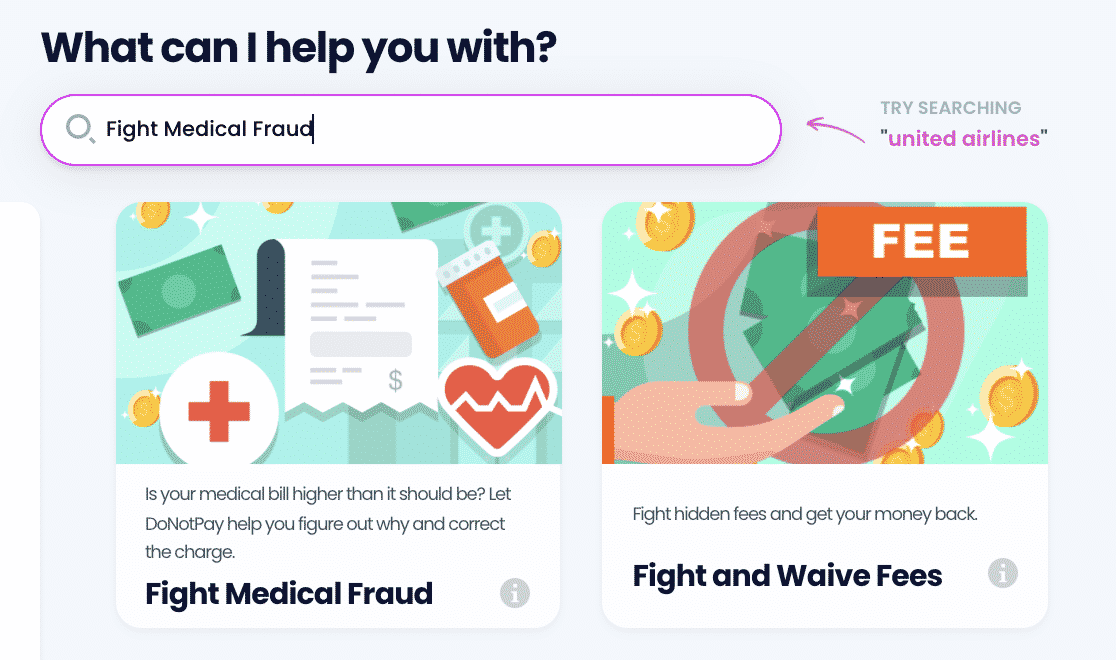
- Tell us the date of your visit, what you were treated for, and where you were treated.
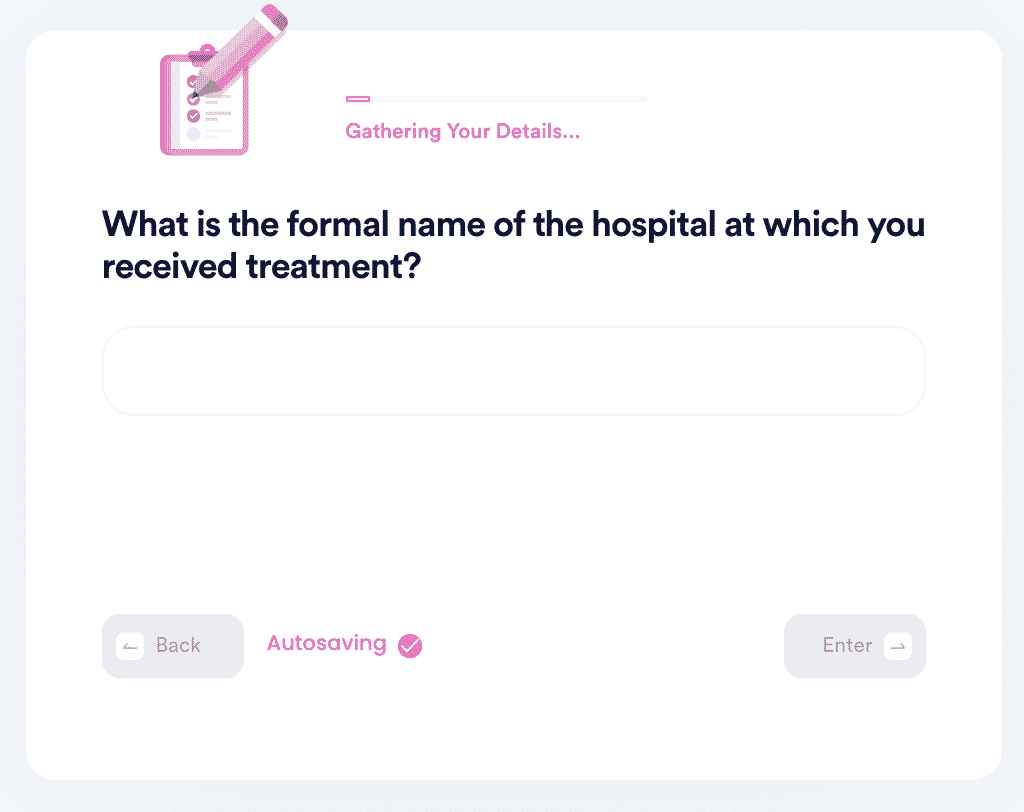
- Let us know what CPT code your visit was filed under. If you don’t know, we’ll generate a letter for you to send to your physician to request the code.
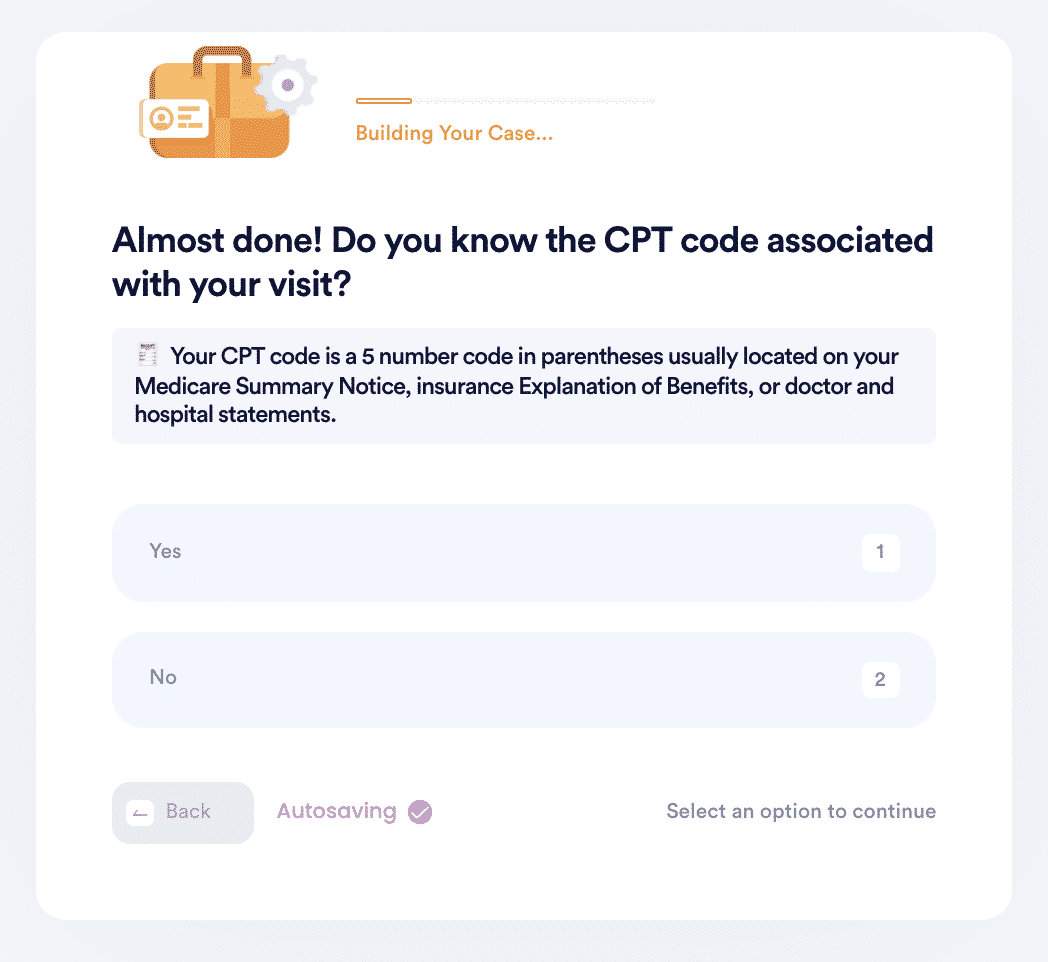
- Choose the correct CPT code or let us know if you want us to find it for you.
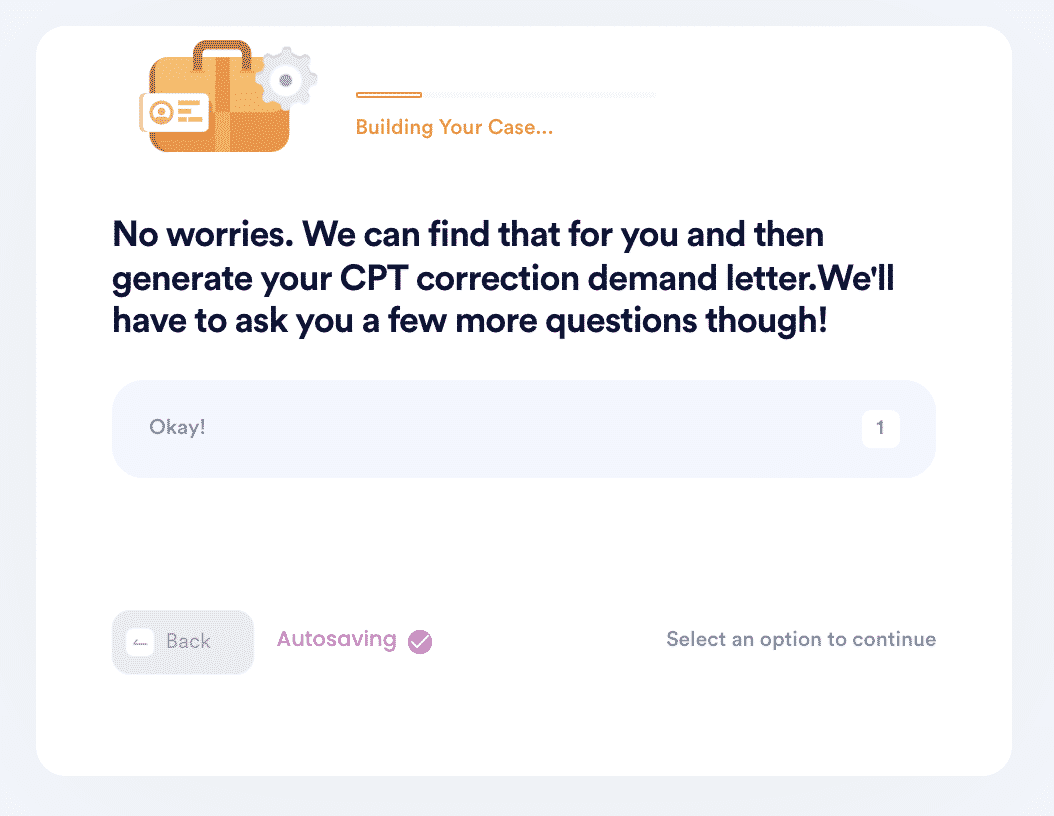
- And that’s it! DoNotPay will automatically find the correct CPT code for your visit if you don’t know it and then generate a demand letter on your behalf to send to your physician for a bill correction.
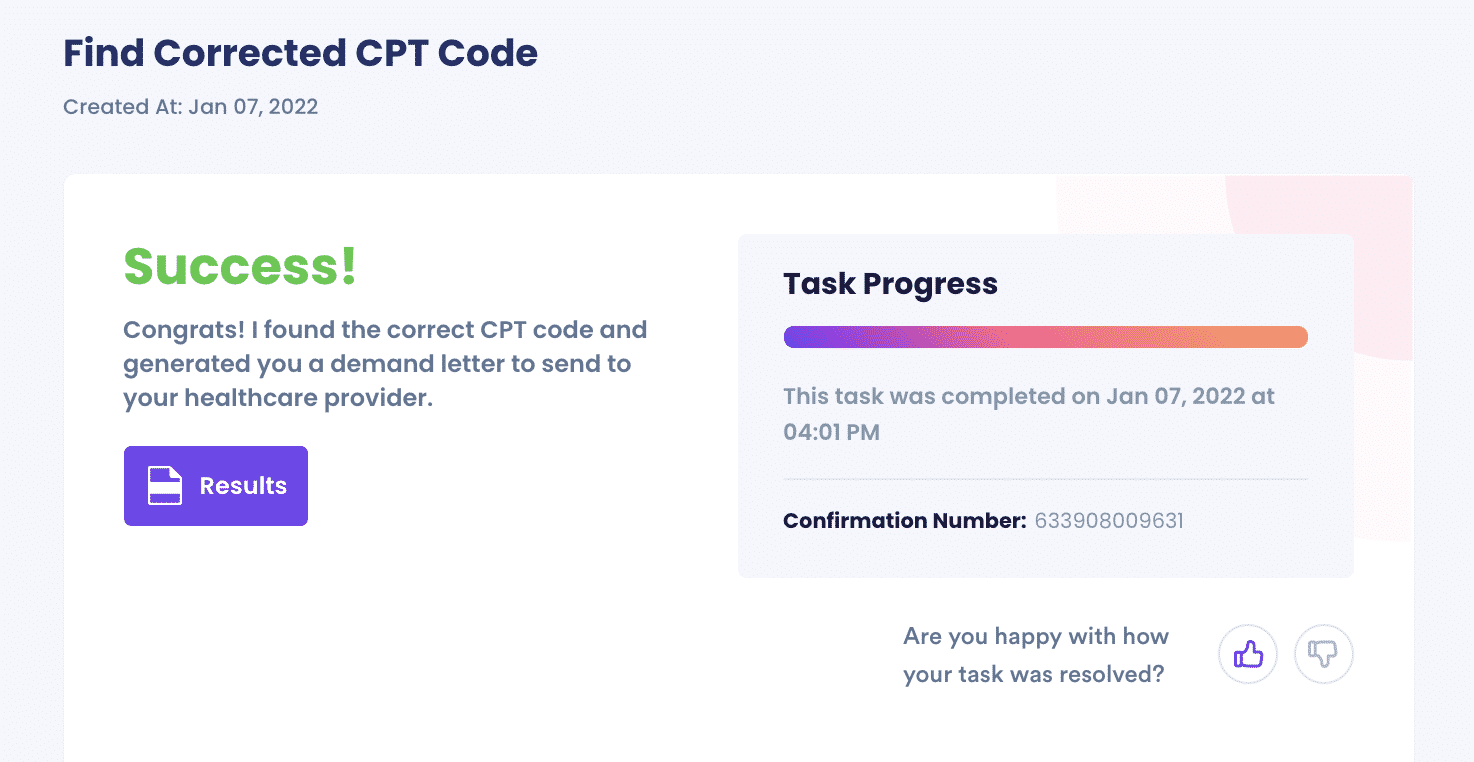
That’s it. We will do everything for you while you sit back knowing you have prevented health care fraud.
What More Can DoNotPay Do to Help You?
Upcoding is a very serious type of fraud that doctors and medical facilities try to get away with. If you want to protect yourself and your ability to have Medicare, you need to do your part to end up coding by reporting it. We’re here to help, but that’s not all that we can do.
Some other services offered by DoNotPay include:
- Creating Advance Healthcare Directives
- Requesting Sick Leave on Your Behalf
- Helping You Will Bills
- Filing Complaints Against Companies
- Suing Others in Small Claims Court
Join DoNotPay to find the correct CPT codes for your bill and demand bill corrections quickly!


